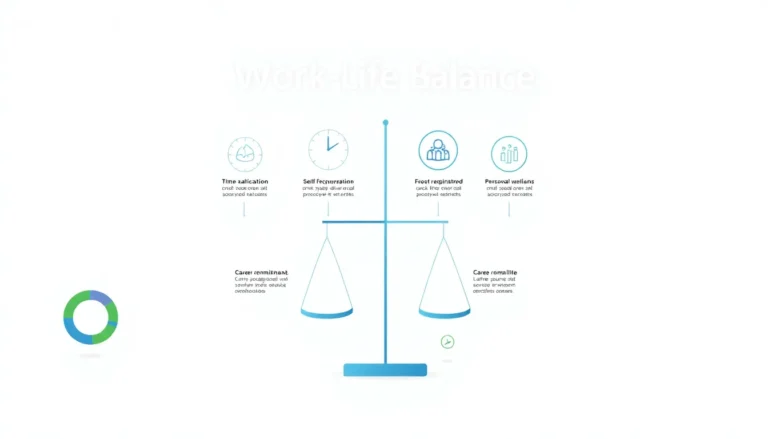Table of Contents
ToggleIn a world that often feels like a chaotic circus, finding effective balance can seem as elusive as a magician’s disappearing act. Yet, mastering this art is crucial for thriving in both personal and professional realms. Imagine juggling work deadlines, family time, and self-care without dropping a single ball—sounds like a dream, right?
Achieving that perfect equilibrium isn’t just about time management; it’s about prioritizing what truly matters. With a sprinkle of humor and a dash of strategy, anyone can learn to navigate the tightrope of life. Whether you’re a busy parent, a career-driven individual, or just someone trying to keep sanity intact, discovering effective balance can transform the daily grind into a well-choreographed dance. Let’s explore how to tip the scales in your favor and make balance your new best friend.
Understanding Effective Balance
Effective balance refers to the ability to maintain equilibrium in various aspects of life, including personal, professional, and emotional dimensions. It signifies prioritizing what matters most while managing numerous responsibilities. Achieving this balance demands more than just time management; it requires a keen understanding of individual values and goals.
Finding effective balance allows individuals to focus on essential tasks without sacrificing their well-being. Establishing clear priorities is crucial. Those who learn to identify what genuinely matters tend to experience less stress and greater fulfillment.
Practicing mindfulness stands out as a proven strategy for enhancing effective balance. Being present in each moment enables a deeper engagement with daily activities. Setting aside specific times for relaxation and reflection fosters tranquility and clarity.
Separately, creating boundaries helps define commitments and expectations. Individuals who communicate their limits effectively can protect their time and energy. Maintaining these boundaries allows for anticipated time to address high-priority tasks without feeling overwhelmed.
Building a supportive network also plays a key role in achieving effective balance. Friends, family, and colleagues can provide encouragement, sharing accountability and the ability to navigate challenges together. Relying on this network enriches personal and professional lives, cultivating a harmonious environment.
Managing energy levels is essential, as individuals experience fluctuations throughout the day. Understanding when to tackle demanding tasks allows for optimized productivity. Balancing high-energy periods with downtime creates room for creativity and rejuvenation.
Effective balance represents an ongoing journey. It requires regular assessment and adjustment as circumstances shift. By continuously prioritizing and adjusting, anyone can find more harmony in life’s complexities.
The Importance of Effective Balance

Effective balance plays a crucial role in enhancing personal and professional success. Achieving this equilibrium allows individuals to prioritize what truly matters in their lives.
Benefits in Personal Life
Effective balance contributes significantly to personal well-being. It alleviates stress and boosts mental health by promoting mindfulness and self-awareness. Individuals experience improved relationships as they invest quality time with family and friends. Prioritizing personal goals leads to increased satisfaction and happiness. People who achieve balance tend to have better physical health as well. They engage in regular exercise and self-care activities, which enhance their overall quality of life.
Benefits in Professional Life
Effective balance yields numerous advantages in the professional realm. It enhances productivity as individuals navigate tasks with greater focus and clarity. Clear boundaries between work and personal time reduce burnout, enabling sustained performance. Prioritization of essential tasks leads to more efficient decision-making and successful outcomes. Stronger collaboration develops within teams, as balanced individuals communicate better and support one another. Moreover, effective balance encourages creativity by allowing mental space for innovation and problem-solving.
Strategies for Achieving Effective Balance
Achieving effective balance involves using practical strategies that cater to personal and professional needs. Two key areas for consideration are time management and setting priorities.
Time Management Techniques
Effective time management techniques enhance productivity. Techniques include the Pomodoro Technique, where one works for 25 minutes and then takes a 5-minute break, maximizing focus. Another method involves using digital tools like calendars or task management apps to organize daily tasks. Scheduling tasks in a way that aligns with energy levels promotes efficiency. Dedicating specific time blocks for deep work helps individuals manage distractions effectively. Regularly reviewing one’s schedule allows for adjustments and ensures that the most important tasks receive adequate attention.
Setting Priorities
Setting priorities is crucial in achieving balance. Individuals must identify key responsibilities and distinguish between urgent and important tasks. Utilizing the Eisenhower Matrix helps categorize tasks based on their urgency and importance. This tool aids individuals in deciding what to tackle immediately, what to plan for later, and what to delegate or eliminate. Recognizing personal values guides prioritization, ensuring alignment with long-term goals. Balancing work and personal life requires ongoing evaluation of priorities, adapting as circumstances change. Prioritizing self-care, family time, and professional commitments helps maintain harmony and fulfillment.
Challenges to Maintaining Effective Balance
Maintaining effective balance presents numerous challenges. Time constraints often lead individuals to prioritize immediate tasks over long-term goals. In addition, societal pressures can create unrealistic expectations, pushing people to overcommit and neglect personal well-being. Burnout becomes common when individuals fail to set clear boundaries in both personal and professional environments.
Emotional resilience is another aspect that often deteriorates. Without a strong support network, managing stress can become overwhelming, which affects productivity and overall happiness. External factors, such as unexpected life changes or work demands, can disrupt balance, necessitating constant reassessment of priorities.
Additionally, the reliance on technology can complicate the pursuit of balance. Digital distractions consume valuable time and energy, hindering focus. This cycle can diminish motivation and clarity, making it harder to identify essential tasks that align with one’s values.
Moreover, the urge for perfectionism can obstruct effective balance. Individuals may feel compelled to excel in every role, leading to feelings of inadequacy when they cannot meet these high standards. Creating an environment that encourages self-compassion helps to counteract this tendency.
Fueling these challenges, the fear of missing out often sways decision-making. People may say yes to multiple obligations, fearing they will fall behind or miss opportunities. Prioritizing tasks effectively becomes difficult in such scenarios.
Recognizing these challenges is the first step toward overcoming them. Regularly assessing one’s priorities and adjusting strategies can lead to a more harmonious existence. Implementing mindful practices and establishing boundaries can create a structure that supports effective balance and overall well-being.
Achieving effective balance is a journey that requires ongoing effort and self-awareness. By prioritizing what truly matters and employing practical strategies, individuals can navigate life’s complexities with greater ease. Embracing mindfulness and setting boundaries cultivates a supportive environment that fosters personal and professional growth.
As individuals continue to assess their priorities and adapt to life’s changes, they’ll find that maintaining balance not only enhances their well-being but also enriches their relationships and productivity. This holistic approach to balance ultimately transforms daily experiences into a more fulfilling and harmonious life.







